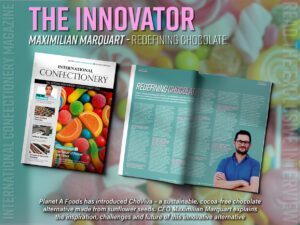Riccardo Satta, Research & Development food technologist of CEPI spa, discusses the latest turnkey solutions the company provides to improve data management and produce solutions for their customers.
Riccardo Satta is a food technologist with two decades of food industry experience both in R&D and in the manufacture of bulk-handling installations. In CEPI, he handles R&D supporting the engineering department in finding the most suitable technical solutions for materials and food products, as well as supporting customers with the development of their installations. Within the Sales Team, he is the Area Manager for Africa. Here, he speaks to International Confectionery about the latest turnkey solutions and how CEPI have developed and grown in recent times.
Cepi is in the process of opening its doors to a new HQ. Can you tell us more about this and how it will boost production and innovation?
After the exceptional growth in the past decade, we have built a new facility that tripled our productive area to a total of 15.000 m2, with a 13.000 m2 factory space and the rest dedicated to offices. The new headquarters include a 240 m2 testing and prototyping room fitted with metrology room, which is a testament to our dedication to research. We will be able to perform more tests and provide more food technology assistance to our customers.
Our aim with is to create a virtuous circle in our research. With a dedicated space one idea will quickly lead to another, in line with a vision that has always been centred around technology and customisation. Our systems are turn-key, which has a deep meaning to us. From technological diversification to personalised innovation, from bulk-handling equipment to data, we aim to provide systems that can be managed in total independence once commissioning is done.
How will you enhance personalisation and support for your customers in this new HQ?
Our customers will be able to perform dosing and conveyance tests directly on their own materials. We also plan to develop system wide prototypes. With prototypes always available, we will be able to test an increasingly wider range of materials. The dosing of minor ingredients often includes new food products or mixes, and the impact of equipment on their characteristic is unknown, requiring tests in controlled conditions. This is the case of mixes for functional or nutraceuticals foods with or without gluten, or resins and pigments in the chemical sector. In the confectionery sector, it is important to test any product with a high fat percentage such as whole milk and powder butter.
Personalisation and innovation are tightly connected to each other for us. Our research is often driven by the specific needs each food manufacturer brings to us: our latest dosing station 3in1 (which combines weighing, blending and direct loading on the pneumatic line) has been developed in response to a customer’s need to optimise his productive area.
We are able to provide turn-key systems because of our technological range, which is not limited to manufacturing equipment but extends to the development of our data management systems.
How does the turnkey quality of CEPI’s installations include machinery but also data?
A turn-key system is a system that manages all processes from storage to dosing. Because CEPI is able to do this for all materials, and additionally to track all ingredients and provide the data, we are able to offer an integrated and fully traceable system that enables food industry operators to always have production under control.
Our Tracking System software provides process control, warehouse management and full traceability with digitalisation of all material movements. Our customers receive a complete picture of the production process in real time: we provide them with a history of storing and dosing operations, consumption statistics, batch report and related deviations, stock visualisation and dynamic graphics illustrating all trends. Ingredients are monitored starting from the moment they enter the warehouse, carrying a virtual label through all production which adds new information every time an operation is performed on the ingredient.
All our data can be easily integrated with global ERP or MES to achieve organisation-wide traceability. Our process control software is open, and the information is immediately available for the user, who can use it however they decide. Because we develop our software completely in-house, we are not bound to any third party and therefore our customers are not either.
Why is data management important and in what ways can customer use the data provided?
Gathering, storing and making data on the materials available is crucial to a healthy process. Firstly, it allows traceability and ensures food security, by knowing which ingredient lot from warehouse was dosed into each final unit. Secondly, process data makes it possible to verify the efficiency of a system.
On top of this, the data can be used in as many ways as the customer wants. They can quickly carry out mass production balances, check consumptions, generate information for Quality Control and Purchases, create projections of future productions and optimise the current process. Data on the tolerance and queue of dosing processes can be used to check the status of the equipment and determine if it requires maintenance.
We are also working on ways to generate more process data, including a historicisation of alarms that can aid in planning personalised maintenance. We are also developing ways to historicise energy consumptions.
For you, what qualifies as a ‘turnkey solution’?
Earlier I mentioned that a turn-key solution in our sector is one that manages all processes from storage to dosing. This is true, but this aspect is a consequence of the main quality of a turn-key solution, which is to make the user completely independent.
What makes a system completely independent? As I said, the process needs to be covered from beginning to end, which in our case means storing to dosing. The builder’s technological offer should be very diversified in order to support any materials and processes the user wishes to include, without the need to involve another supplier. Then, the builder needs to possess all expertise needed to design, build and commission the system.
This is our working method. CEPI has been founded and has grown around the very idea of being turn-key provider.
Why do you feel this kind of solution has value for your customer?
The customer is using a tailor-made installation that has been designed to meet their needs. We automate and optimise their production, enabling their growth in a modular way without ever overturning their process. This means that a food manufacturer won’t have to adapt to a pre-made solution but rather the opposite happens.
Aside from the obvious considerations over reduced costs, working with a single provider also means interfacing with only one interlocutor, who will have complete knowledge of their system, and who has designed, built and commissioned it.
Do you believe every installation requires an open dialogue with customers and crew?
Every installation is unique and has its own story. This is the heart of turn-key work: the dialogue and information exchange with the customer is always open, which creates growing opportunities for both of us. If the customer chooses it, CEPI can enter more deeply in their process and create an optimisation proposal based on our experience. This is the case of a recent collaboration where we designed a more efficient dosing solution to include fruit and chocolate in a biscuit line, all without altering the authentic flavour of their product.
What challenges do raw materials pose and why is a turnkey solution integral to manage these?
A system is only turn-key if it overlooks all aspects of the production context it operates in. In our systems, the materials are managed and traced from the beginning to the end of the process. This not only allows extreme precision in the set-up of each operation (with management of aspects such as temperature and atmosphere), but also, we can constantly adjust them on the basis of the data.
Every ingredient brings their own challenges. Fats, milk derivatives and creams require temperature management through storing and dosing, while dehumidified air must be used for hygroscopic materials such as sugar and salt require the use of dehumidified air. Viscous ingredients require specific transport and dosage methods.
A turn-key partner like CEPI will be able to identify all such needs and provide the solutions required. Crucially, all these issues will be managed organically, coordinating complex processes in the most efficient way and producing data that is already integrated.
What solutions does cepi provide for the confectionery market? How do the turnkey solutions of real-time data work with this?
Our method is applied across the board. The confectionery manufacturers that work with us gain a modular and flexible system, access to an unparalleled technological offer and a tailor-made data management system.
Other than storing and dosing, we provide solutions such as independent invert sugar production, sugar milling with relative dosing system for the production of crystal sugar, management of liquid products with appropriate storage and conveying on the basis of their individual characteristics, storage and dosing of fats, pastes and cream. We provide rework technology for biscuit scrap, including sandwich biscuits.
In confectionery, accurate blending and dosing, all the way to the addition of inclusions, are fundamental. That is where our automation system and the data we provide will make a key difference, as the automation is so customised and the data so detailed. The dosing stations we provide span from modular hoppers, to broad spectrum dosing stations for minor ingredients, to the 3in1 station, a system which weighs and blends in a single unit.
To stay up to date on the latest, trends, innovations, people news and company updates within the global confectionery market please register to receive our newsletter here
Media contact
Roshini Bains,
Editor, International Confectionery
Tel: +44 (0) 1622 823 922
Email: [email protected]









